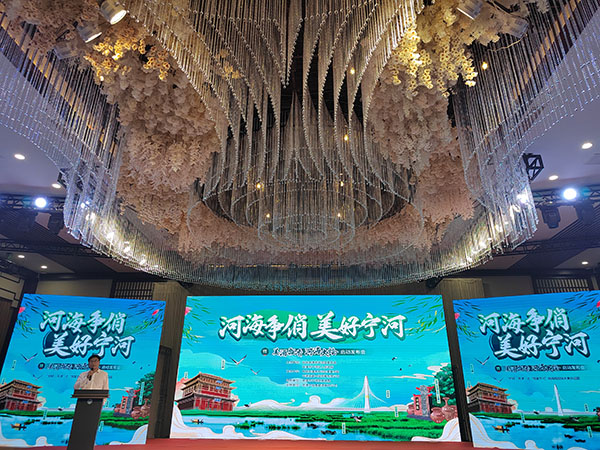
[Photo provided to chinadaily.com.cn]
A launch ceremony for promotional activities in Ninghe District, Tianjin, was held on June 7 to attract tourists from all over the country to enjoy the beautiful scenery, wine, and food in Ninghe.
The activities are intended to make the district a new landmark in Tianjin.
Bai Fengxiang, Secretary of the CPC Ninghe District Committee, said in his speech at the ceremony that rice production and delicious food have been time-honored brands for Ninghe, and they represent the district’s integrated development of agriculture, culture and tourism.
Bai also explained the development advantages and direction of Ninghe.
He said Ninghe boasts profound historical and cultural roots, featuring a number of local cultures such as canal culture and farming culture, a variety of intangible cultural heritage skills, including New Year woodblock prints and paintings, paper-cutting, and woodcarving, and one of the largest ancient coasts in the world.
Ninghe also has a good location and convenient transportation. Located in the center of the Beijing-Tianjin-Tangshan urban agglomeration, it serves as the "East Gate" of Tianjin and connects it to the Circum-Bohai-Sea. It also has nine expressways and a railway has been approved to be built.
In addition, Ninghe features a good natural environment that could power the high-quality development of agriculture. By sticking to water-centered ecology and striving to build its own crab brand, the district has released 240 million native baby crabs and has successfully cultivated giant rice.
The district also has the first state-level modern agricultural industrial park and the largest per capita arable land area in Tianjin. The planting area of Xiaozhan Rice has reached 18,667 hectares, while the district's rice and crab polyculture area accounts for nearly 50 percent of the total area of Tianjin.
With many famous residents and former homes of celebrities and revolutionary relics, Ninghe has been exploring tourism resources that will help drive the integrated development of agriculture, culture and tourism.
Bai said that based on these advantages, Ninghe will speed up development centering on its river systems, rice fields, special food, and home-stay accommodation. More efforts will be made to provide a beautiful environment, increase supporting facilities, and improve public services.
The district will endeavor to integrate the development of agriculture, culture and tourism as a new growth pole through precise planning, fast and concrete action, and innovative and effective publicity measures, Bai added.





